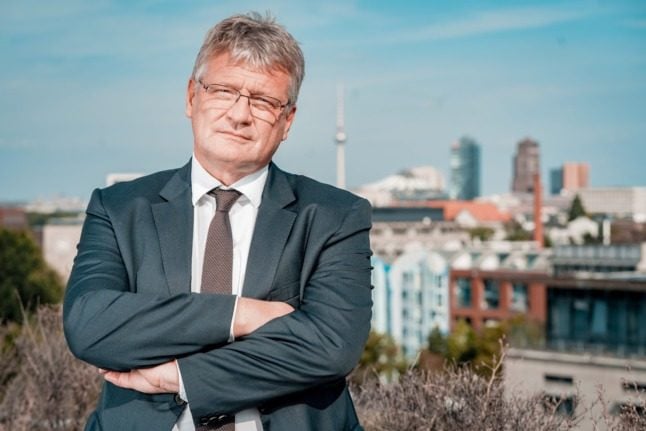“The party’s heart beats very far to the right today,” the 60-year-old told broadcaster ARD in an interview, saying he had failed to find middle ground with the party’s extremist faction.
Meuthen, seen as one of the more moderate voices in the far-right Alternative for Germany (AfD), already said late last year that he would give up his role as the party’s federal spokesman, following a disappointing election result and bitter internal divisions.
But he has now decided to leave the party altogether.
Meuthen, AfD co-leader since 2015, has long been locked in a power struggle with heavyweight party hardliners, including co-leader Tino Chrupalla, parliamentary leader Alice Weidel and the head of the AfD in Thuringia state, Bjoern Höcke.
“They will be really happy that Meuthen is finally gone,” Meuthen told ARD. “They worked on that for a long time.”
Some in the AfD have become far removed from “the basic order of freedom and democracy”, Meuthen went on, and showed “clear totalitarian leanings”.
Meuthen however said he would stay on as a member of the European Parliament.
Founded in 2013 as a eurosceptic outfit, the AfD seized on popular anger over an influx of refugees in 2015-2016 to reinvent itself as an anti-immigrant, anti-Islam party.
It has repeatedly courted controversy by urging Germans to stop atoning for World War II atrocities. Höcke once called for a “180 degree reversal” of the country’s remembrance culture.
READ ALSO:
- Holocaust survivor urges Germany to fight ‘cancer’ of hatred
- ‘Yes to Dexit’: Germany’s far-right AfD firms up election strategy
The AfD stunned the political establishment when it secured almost 13 percent of the vote in the 2017 general election, entering parliament for the first time.
But support for the party slipped to around 10 percent in last year’s election, as the country reeled from the coronavirus pandemic and concerns about migration waned.
The AfD has since sought to court critics of the government’s coronavirus measures, with leading figures joining demonstrations that have attracted a mix of neo-Nazis, anti-vaxxers and conspiracy theorists.
AfD lawmakers have been admonished in parliament for not wearing their face masks properly and the party is a vocal opponent of government plans to introduce a vaccine mandate.
Meuthen said something “cult-like” had developed around the AfD’s coronavirus attitudes.




 Please whitelist us to continue reading.
Please whitelist us to continue reading.
Member comments